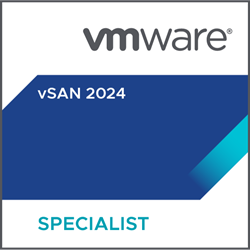Obiettivi | Certificazione | Contenuti | Tipologia | Prerequisiti | Durata e Frequenza | Docenti | Modalità di Iscrizione | Calendario

Il Corso VMware vSAN: Install, Configure, Manage [V8] è un programma didattico che offre ai partecipanti un’ampia comprensione della tecnologia vSAN e delle sue applicazioni. Durante il corso, i partecipanti avranno l’opportunità di apprendere le nozioni fondamentali della tecnologia vSAN, tra cui la sua architettura, le componenti software e le modalità di integrazione con altre tecnologie VMware.
I partecipanti verranno introdotti alle varie fasi della pianificazione, implementazione e gestione di un cluster vSAN, imparando a tenere conto delle esigenze di storage, della tolleranza agli errori e delle migliori pratiche per la configurazione di reti vSAN. Verranno anche fornite istruzioni dettagliate sulla configurazione e l’ottimizzazione delle politiche di storage vSAN, oltre a spiegazioni sulle tecniche di resilienza e disponibilità dei dati.
Inoltre, il corso copre argomenti quali l’efficienza dello spazio di archiviazione, le operazioni di sicurezza, l’uso di vSAN HCI Mesh e i servizi di File e iSCSI Target. Si approfondiranno anche concetti come i cluster vSAN Stretched e a due nodi, la manutenzione e il monitoraggio del cluster, la risoluzione dei problemi e la vSAN Express Storage Architecture. Il corso contribuisce alla preparazione dell’esame di Certificazione VMware Certified Specialist vSAN 2024.
Contattaci ora per ricevere tutti i dettagli e per richiedere, senza alcun impegno, di parlare direttamente con uno dei nostri Docenti (Clicca qui)
oppure chiamaci subito al nostro Numero Verde (800-177596)
Obiettivi del corso
Di seguito una sintesi degli obiettivi principali del Corso VMware vSAN: Install, Configure, Manage [V8]:
- Comprendere l’architettura e i componenti software di vSAN.
- Implementare e gestire cluster vSAN, considerando aspetti come storage e tolleranza agli errori.
- Configurare e ottimizzare le politiche di storage vSAN.
- Approfondire temi come la resilienza dei dati, l’efficienza dello spazio di archiviazione e la sicurezza.
- Conoscere i servizi vSAN HCI Mesh, File e iSCSI Target, e l’architettura di storage vSAN Express.
Certificazione del corso
Esame VMware Certified Specialist vSAN 2024; Questo esame valuta le competenze approfondite dei candidati nel campo della virtualizzazione storage con VMware vSAN. L’esame si concentra sulla capacità dei candidati di installare, configurare e gestire l’ambiente vSAN, compresa l’architettura, i componenti chiave, e le pratiche di configurazione. Viene inoltre testata la conoscenza nell’implementazione e gestione di cluster vSAN, nonché nella risoluzione di problemi comuni e nella manutenzione. Altri argomenti includono la comprensione delle policy di storage vSAN, la resilienza dei dati, l’efficienza dello spazio di archiviazione, la sicurezza e l’integrazione con altre soluzioni VMware. Questo esame misura le capacità degli esaminati nel realizzare una soluzione vSAN efficiente e sicura in un ambiente enterprise.
Contenuti del corso
Module 1: Course Introduction
- Introduction and course logistics
- Course objectives
Module 2: Introduction to vSAN
- Describe vSAN architecture
- Describe the vSAN software components: CLOM, DOM, LSOM, CMMDS, and RDT
- Identify vSAN objects and components
- Describe the advantages of object-based storage
- Describe the difference between All-Flash and Hybrid vSAN architecture
- Explain the key features and use cases for vSAN
- Discuss the vSAN integration and compatibility with other VMware technologies
Module 3: Planning a vSAN Cluster
- Identify requirements and planning considerations for vSAN clusters
- Apply vSAN cluster planning and deployment best practices
- Determine and plan for storage consumption by data growth and failure tolerance
- Design vSAN hosts for operational needs
- Identify vSAN networking features and requirements
- Describe ways of controlling traffic in a vSAN environment
- Recognize best practices for vSAN network configurations
Module 4: Deploying a vSAN Cluster
- Recognize the importance of hardware compatibility
- Ensure the compatibility of driver and firmware versioning
- Use tools to automate driver validation and installation
- Apply host hardware settings for optimum performance
- Use VMware vSphere® Lifecycle ManagerTM
- to perform upgrades
- Deploy and configure a vSAN Cluster using the Cluster QuickStart wizard
- Manually configure a vSAN Cluster using VMware vSphere® Client™
- Explain and configure vSAN fault domains
- Using VMware vSphere® High Availability with vSAN
- Understand vSAN Cluster maintenance capabilities
- Describe the difference between implicit and explicit fault domains
- Create explicit fault domains
Module 5: vSAN Storage Policies
- Describe a vSAN object
- Describe how objects are split into components
- Explain the purpose of witness components
- Explain how vSAN stores large objects
- View object and component placement on the vSAN datastore
- Explain how storage policies work with vSAN
- Define and create a virtual machine storage policy
- Apply and modify virtual machine storage policies
- Change virtual machine storage policies dynamically
- Identify virtual machine storage policy compliance status
Module 6: vSAN Resilience and Data Availability
- Describe and configure the Object Repair Timer advanced option
- Plan disk replacement in a vSAN cluster
- Plan maintenance tasks to avoid vSAN object failures
- Recognize the importance of managing snapshot utilization in a vSAN cluster
Module 7: Managing vSAN Storage Space Efficiency
- Discuss deduplication and compression techniques
- Understand deduplication and compression overhead
- Discuss compression only mode
- Configure erasure coding
- Configure swap object thin provisioning
- Discuss reclaiming storage space with SCSI UNMAP
- Configure TRIM/UNMAP
Module 8: vSAN Security Operations
- Identify differences between VM encryption and vSAN encryption
- Perform ongoing operations to maintain data security
- Describe the workflow of data-in transit encryption
- Identify the steps involved in replacing Key Management Server
- Module 9: vSAN HCI Mesh
- Understand the purpose of vSAN HCI Mesh
- Detail vSAN HCI Mesh technology and architecture
- Perform mount and unmount of a remote datastore
Module 10: vSAN File Service and iSCSI Target Service
- Understand the purpose of vSAN File Services
- Detail vSAN File Services architecture
- Configure vSAN File Shares
- Describe vSAN iSCSI Target Service
Module 11: vSAN Stretched and Two Node Clusters
- Describe the architecture and uses case for stretched clusters
- Detail the deployment and replacement of a vSAN witness node
- Describe the architecture and uses case for two-node clusters
- Explain storage policies for vSAN stretched cluster
Module 12: vSAN Cluster Maintenance
- Perform typical vSAN maintenance operations
- Describe vSAN maintenance modes and data evacuation options
- Assess the impact on cluster objects of entering maintenance mode
- Determine the specific data actions required after exiting maintenance mode
- Define the steps to shut down and reboot hosts and vSAN clusters
- Use best practices for boot devices
- Replace vSAN nodes
Module 13: vSAN Cluster Monitoring
- Describe how the Customer Experience Improvement Program (CEIP) enables VMware to improve products and services
- Use VMware Skyline Health for monitoring vSAN cluster health
- Manage alerts, alarms, and notifications related to vSAN in VMware vSphere® Client™
- Create and configure custom alarms to trigger vSAN health issues
- Use IOInsight metrics for monitoring vSAN performance
- Use a vSAN proactive test to detect and diagnose cluster issues
Module 14: vSAN Troubleshooting
- Use a structured approach to solve configuration and operational problems
- Apply troubleshooting methodology to logically diagnose faults and optimize troubleshooting efficiency
- Use VMware Skyline Health to investigate and help determine failure conditions
- Explain which log files are useful for vSAN troubleshooting
Module 15: vSAN Express Storage Architecture
- Understand the purpose of vSAN Express Storage Architecture
- Describe the vSAN Express Storage Architecture components
- Identify Storage Policy differences
- Understand compression and encryption operation differences
Tipologia
Corso di Formazione con Docente
Docenti
I docenti sono Istruttori Autorizzati VMware e in altre tecnologie IT, con anni di esperienza pratica nel settore e nella Formazione.
Infrastruttura laboratoriale
Per tutte le tipologie di erogazione, il Corsista può accedere alle attrezzature e ai sistemi presenti nei Nostri laboratori o direttamente presso i data center del Vendor o dei suoi provider autorizzati in modalità remota h24. Ogni partecipante dispone di un accesso per implementare le varie configurazioni avendo così un riscontro pratico e immediato della teoria affrontata. Ecco di seguito alcuni scenari tratti dalle attività laboratoriali:
![Corso VMware vSAN Install, Configure, Manage [V8]](https://www.vegatraining.eu/wp-content/uploads/2023/12/Corso-VMware-vSAN-Install-Configure-Manage-V8.png)
Dettagli del corso
Prerequisiti
- Si consiglia la partecipazione al Corso VMware VCP-DCV.
Durata del corso
- Durata Intensiva 4gg;
Frequenza
Varie tipologie di Frequenza Estensiva ed Intensiva.
Date del corso
- Corso VMware vSAN: Install, Configure, Manage [V8] (Formula Intensiva) – 02/09/2024 – 9:00 – 17:00 (TD SYNNEX)
Modalità di iscrizione
Le iscrizioni sono a numero chiuso per garantire ai tutti i partecipanti un servizio eccellente.
L’iscrizione avviene richiedendo di essere contattati dal seguente Link, o contattando la sede al numero verde 800-177596 o inviando una richiesta all’email [email protected].


